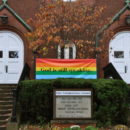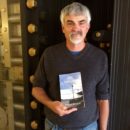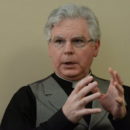The parking lot at the Islamic Society of Western Massachusetts filled up fast, and then drivers parked along the neighborhood side streets. The mosque’s main hall was standing room only. Hundreds showed up Wednesday for an interfaith conversation about hate crimes in the area.
According to the Anti-Defamation League, the number of incidents in Massachusetts are up three-fold since the election.
“How is everyone doing back there?” Mohammad Salim Bajwa asked from the podium. Bajwa, the mosque’s treasurer and a physician in nearby Holyoke, guided half-a-dozen speakers through a more than two-hour talk. An imam, a rabbi, a priest, a representative from the state attorney general’s office and others spoke of unity and available resources.
Unified Against Hate
In between speakers, Bajwa promised a good dinner was coming. Through the open door of the mosque’s kitchen, platters of rice and chicken, falafel, and piles of muajanat — a Lebanese version of spicy beef pies — were being kept warm. The dozens of Episcopalians, Lutherans, Catholics, Muslims, Jews did not appear to need incentive to stay. As different as this group is in religious beliefs, they are solidly unified in trying to stop, or at least stem, the increasing number of hate incidents they witness in their communities and at work.
Martin Pion, who teaches religion at Elms College, said he’s not seen anything so concentrated before, or at least in decades. Pion is also the president of the Interfaith Council of Western Massachusetts.
“The [recent] anti-Jewish graffiti painted on Mount Tom, the vandalism at this very mosque and hate letters sent to other mosques in Massachusetts — acts of this nature leave us feeling both sad and alarmed,” he said.
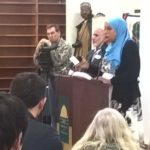 The words “Go Home” were scratched into the car of a West Springfield couple, originally from Puerto Rico. A Muslim family had called the state AG’s hate crime hotline and said they had been run off the road.
The words “Go Home” were scratched into the car of a West Springfield couple, originally from Puerto Rico. A Muslim family had called the state AG’s hate crime hotline and said they had been run off the road.
‘And it’s happening right here in Western Massachusetts’
Tahirah Amatul-Wadud, an attorney in Chicopee, said she hears from Muslim women first-hand how they are being targeted. It’s easy because of their hijabs, she said.
“Everyday I hear a story about people who are being told ‘take this off your head or I’ll kill you.’ And it’s happening right here in Western Massachusetts.”
Amatul-Wadud, a member of the Islamic Society of Western Massachusetts, said some people are afraid to report the incidents. She encouraged them to do so.
While she is is deeply concerned, she’s also heartened by the number of calls that came into the mosque over the past few months. People are asking how they can 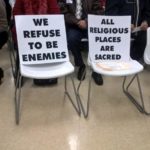 help.
help.
“To be honest, we don’t have all the answers,” Amatul-Wadud told the crowd. But it became clear as she spoke, that doesn’t’ mean anyone should stand by, idle.
“First and foremost, we are people of faith. We all believe in something,” Amatul-Wadud said. “Hold on to the Ten Commandments, regardless of which version you identify as your own.”
Amatu-Wadud encouraged people to organize on a “small” level. If you have an expertise, offer it, she said.
[“If you] work in human resources or a lawyer, hold consultations or workshops. If you’re in the mental health field, set up support groups for adults, for teens, to talk about how they’re feeling,” Amatu-Wadud said.
She went on: hold a luncheon, share ideas on social media. She encouraged Jews and Christians to invite Muslims to dinner, and Muslims to invite others into their circles.
“Help the victim, council the offender, back to those Ten Commandments, the Golden Rules, the traditions of the Holy Prophets. We owe duties to each other as neighbors,” Amatu-Wadud said.
It is fair to say that in this room, the priests, the rabbis, the imams, and others who spoke, were preaching to the choir. Many also acknowledge the messages have to go farther and become more concrete. That’s because there is no end to hate, said Kamal Hassan Ali, also a founding member of the ISWM.
“As long as there are people in the world who intend to do harm, and there will always be, then we have to be ever diligent about trying to maintain what we called the principles a part of all of these faiths,” he said, adding that these good people have to be better organized.
Ali is the Hampden County jail imam and a former union organizer. He said, “Liberals are known for long conversations.”
But Ali also described himself as an optimist. Maybe that organizing, he said, will happen in the the next two or three meetings.
Correction: The version of this story that aired on December 15 and 16 incorrectly identified Martin Pion as Rev. Martin Pion.
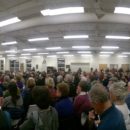

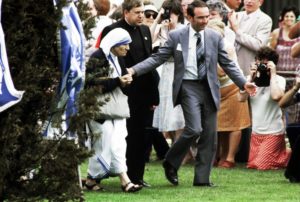 Thirty-one years ago, the Roman Catholic nun and missionary delivered that message at UMass Amherst on June 22, 1985.
Thirty-one years ago, the Roman Catholic nun and missionary delivered that message at UMass Amherst on June 22, 1985.